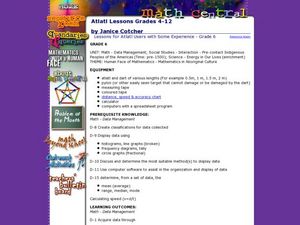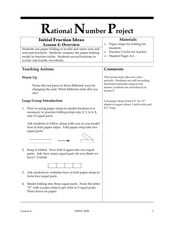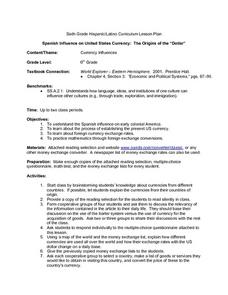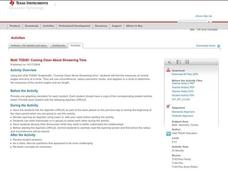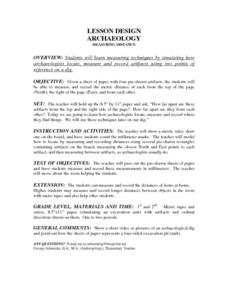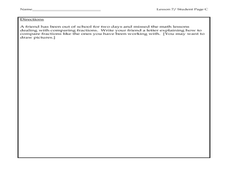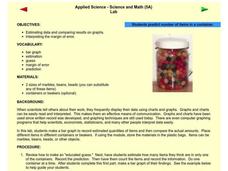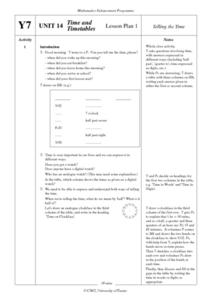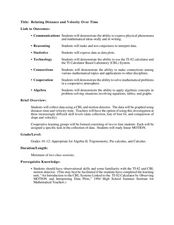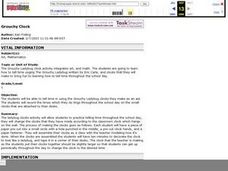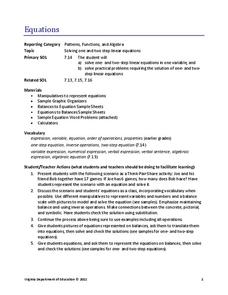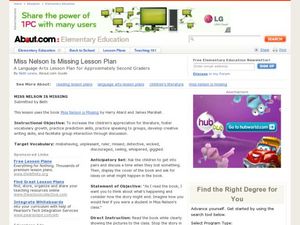Curated OER
Lessons for Atlatl Users with Some Experience-Grade 6
Sixth graders experiment with an atlatl and dart. For this sixth grade data management mathematics lesson, 6th graders explore and determine the most suitable methods of displaying data collected from their experimentation with...
Curated OER
Be Direct - Oil Spills on Land
Students participate in an activity to simulate direct variation. In this oil spills on land lesson plan, students participate in a simulation using toilet paper and vegetable oil to explore the characteristics of direct variation. They...
Curated OER
Introductory Lesson- Patterns
First graders explore patterns in mathematical context. In this patterns lesson, 1st graders inspect patterns shown to them, copy patterns, complete patterns and create patterns of their own. These patterns are shown by actions, drawing,...
Rational Number Project
Initial Fraction Ideas Lesson 4: Overview
First-time fraction fiends make paper-folding models for unit and non-unit fractions. They follow teacher-led directions to make models that show 2, 3, 4, 6, 8, and 12 equal parts. An array of fraction review worksheets are...
Curated OER
Spanish Influence on United States Currency: The Origins of the "Dollar"
Sixth graders research the Spanish influence on early colonial America and the process of establishing the present U.S. currency. They read and discuss an informational handout in small groups, and take a short quiz. Students then...
Curated OER
Coming Clean About Showering Time
Learners measure objects using the Cabri Jr. application in this technology lesson. Your class will explore the TI-83 and 84 incorporated with Cabri Jr. to solve business related problems. This is a technology based lesson.
Curated OER
Lesson Design Archaeology- Measuring Distance
Young scholars measure and write specific metric distances. In this archaeology lesson, students are given specific artifact locations on a map and measure the distance using millimeters.
Curated OER
Initial Fraction Ideas Lesson 7: Overview
Third graders recognize that the larger the denominator of a fraction, the smaller the piece you have. In this fraction instructional activity, 3rd graders compare fractions and order them from largest to smallest. Students...
Curated OER
Keeping Watch on Coral Reefs
Students investigate the dangers Coral Reefs face by investigating satellite images. In this environmental protection lesson, students utilize the Internet to discover the types of satellites and sensors used to provide...
Curated OER
Applied Science - Science and Math Lab
Students make a prediction. In this applied science instructional activity, students guess the number of items in a jar. Students create a bar graph to show the predictions and the actual amounts.
Curated OER
Livelihood of the Times
Students recognize the importance of analyzing historical information and data. In this historical analysis lesson, students collect information for a bar graph, complete a jobs worksheet and define vocabulary.
Curated OER
Honing in on Hummingbirds
Students explore ruby-throated hummingbirds. In this cross-curricular hummingbirds lesson, students listen to the book The Mystery of the Missing Hummingbirds and choose related topics to research with a partner. Students draw or...
Curated OER
Telling Time By the Hour
First graders explore how to tell time by the hour. They draw the minute and hour hands on a clock to match the time shown by the teacher on the overhead clock. Students write the time shown on a worksheet. They read "The Grouchy Ladybug."
Curated OER
Time Zones in the United States
Eighth graders explore how to use the time zones in the United States and internationally. They use elapsed time to solve problems. Students calculate the time in various places in the United States. They discuss the 6 time zones in the...
Curated OER
Introduction to Time
Students explore the concept of time. Through discussion and artistic projects, they define time in their own words and tell how it is used to represent the seasons. Students draw a picture to portray time as it elapses during the...
Curated OER
Time and Timetables
Students, after answering a variety of questions involving time expressed in different ways, draw a table to illustrate time in words as well as digits. In connection, they observe time on analogue watches and clock faces along with what...
Curated OER
Going My Way (High School Math)
Students solve uniform motion problems using formula d = rt.
Curated OER
Relating Distance and Velocity Over Time
Students calculate the distance and velocity over time. In this algebra instructional activity, students graph a linear function to represent the distance vers time travel. They interpret their graphs and draw conclusion.
Curated OER
Grouchy Ladybug
First graders are going to learn how to tell time using The Grouchy Ladybug written by Eric Carle, and clocks that they will make to bring fun to learning how to tell time throughout the school day.
Virginia Department of Education
Equations
Science equipment can be handy for math class, too. Scholars learn to solve one- and two-step linear equations by using the concept of a balance. They solve real-world problems in a variety of contexts by writing and solving linear...
Virginia Department of Education
Order Up!
Order in the math class! Scholars learn to evaluate expressions using the order of operations. A game has them rolling number cubes to determine numbers to use when evaluating.
Curated OER
Clock Hands That Erase!
Students draw and decorate a clock face. They work in pairs, students take turns drawing clock hands to show a specific time on the clock face. Students check each other's clock-reading abilities.
Curated OER
How Much Do I Watch TV?
In this television watching worksheet, students determine the amount of television they watch in a week by recording the names and times of the shows. They total the number of hours of watching time. You can use this with upper...
Curated OER
Miss Nelson is Missing Lesson Plan
Second graders listen to the story Miss Nelson is Missing by Harry Allard and James Marshall. In this literature lesson, 2nd graders predict the story's ending with drawings and discussions within groups.


